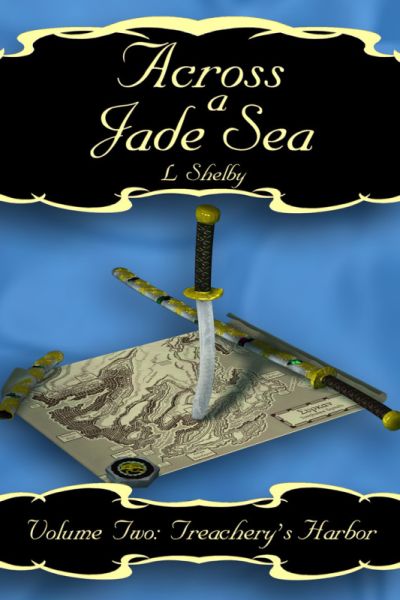Same tree, bigger rocks
Treachery’s Harbor (Across a Jade Sea, volume 2)
By L. Shelby

1 Jun, 2015
0 comments
2014’s Treachery’s Harbor continues the Across a Jade Sea series, picking up where Serendipity’s Tide left off: the completely unexpected revelation by Chunru Dachahl Pralahnru to his new bride Batiya that he is not a burgie [1], that is, someone whose family is somewhat more well-to-do than her working-class clan. Rather, he is the sole unequivocally legitimate heir to the Emperor of Changali. “I am the heir to a vast and powerful empire” seems like the sort of personal detail that should have come up at some point during Chunru and Batiya’s courtship, but in his defense, it was a lightning romance and also people were trying to kill the two of them at the time.
Domestic crises aside, Chunru still has to find his way across a foreign, balkanized continent to Changali’s embassy in Xercalis, in the hope that he can repair the inexplicable rift between Changali and Xercalis. Batiya has too much potential hostage value to be left behind, so she will have to come as well.
The player on the other side, whoever that is, is determined to keep Chunru from reaching his destination. The hidden enemy has access to enough funds to send wave after wave of hired killers after Chunru and his wife. While the hired guns are invariably not quite good enough at their job to kill Chunru (although they do have a nice sideline in massive property damage), they come close enough, often enough, that it is a very battered Chunru and Batiya who finally reach the embassy in Xercalis.
The punishment for success is more work: having eluded the assassins, Chunru now has to work out what caused the rift between Changali’s ambassador Lord Hahtung and Xercalis’ King Harluce. The King appears to have taken great offense to one of Hahtung’s letters but Hahtung has the originals of the letters and neither he nor Chunru can see what might have offended the King.
Of course, the language in which Hahtung is literate and the one Harluce can read are very different. Every letter from one to the other has to pass through the hands of trusted intermediaries. Although every member of the embassy staff should be above suspicion, one of them — and Chunru has a pretty good idea which one — has been carrying out a highly successful man-in-the-middle attack on the friendly relationship between Changali and Xercalis.
Knowing who is one thing: learning why will uncover a crisis that threatens the Imperial regime itself!
~oOo~
While the first book in the series was told from the point of view of the unconventional Batiya, this one is entirely from Chunru’s perspective. Batiya’s experiences of other lands might have been as minimal as observing their seacoasts from the deck of a passing ship, but she at least understands her own region well enough to cope with the ins and outs of local custom. Xercalis is foreign to her but not too foreign. The rather formal Chunru finds himself dealing with an alien and often perplexing culture. This book follows his gradual acculturation rather nicely.
While I thought the running-away-from-hired-guns section of the book was a tad too long (particularly given that we already had a whole book of that in Serendipity’s Tide), once Chunru starts investigating the mystery of the offensive letters, things pick up again nicely. I have to give the author points for imagining a motivation for the whole affair that I didn’t see coming. It was plausible once revealed, but it was not predictable. The solution reveals a greater crisis than mere assassinations or diplomatic shenanigans, one that Chunru is going to have a hell of a time resolving.
To grumble a bit about an issue that I suspect may be peculiar to me: Changali seems to be this world’s version of our China. It’s a China analog that is trying to catch up with the Europe analog [2]. I understand that the real-world China, post-1800 or so, did not deal with the rest of the world from a position of strength, but … the last two centuries of Chinese history have been highly atypical. Just once I’d like to see a fantasy novel about a Western analog culture imitating a China-analog civil service, with its ranks of highly educated, competitively chosen, tea-drinking bureaucrats. Oh, well: review the book the author wrote, not the one you wish they had written.
Once again, Shelby has written an amusing romantic adventure. While the crisis at the beginning of the book will make more sense if the reader has already read the first book in the series, the second book functions well enough as a standalone. (I should perhaps point out that the first book isn’t expensive and is available here.) By the end of the novel, the author has raised the stakes impressively. How is Chunru is going to manage the crisis facing his father’s empire? I assume that this will be the focus of the next volume.
Treachery’s Harbor may be purchased here.
1: Which must be derived in some way from “bourgeois.”
2: Minus such fun developments as the Opium Wars, the First Sino-Japanese War, the Taiping Rebellion, the Punti-Hakka Clan Wars, the Nian Rebellion, the Miao Rebellion, the Panthay Rebellion, and the Dungan Revolt, not to mention the Northern Chinese Famine of the 1870s, the Yellow River Flood, and occasional outbreaks of cholera … oh, and the Black Death. On the whole, the 19th century was somewhat short of entirely wonderful for China.
Changali, the China analog, seems to having a much easier time of it than the real China. Having a harder time of it would probably have required events like devastating meteor showers [3] and Lovecraftian horrors erupting out of the ground.
3: Which China has experienced, just not in the 19th century.
